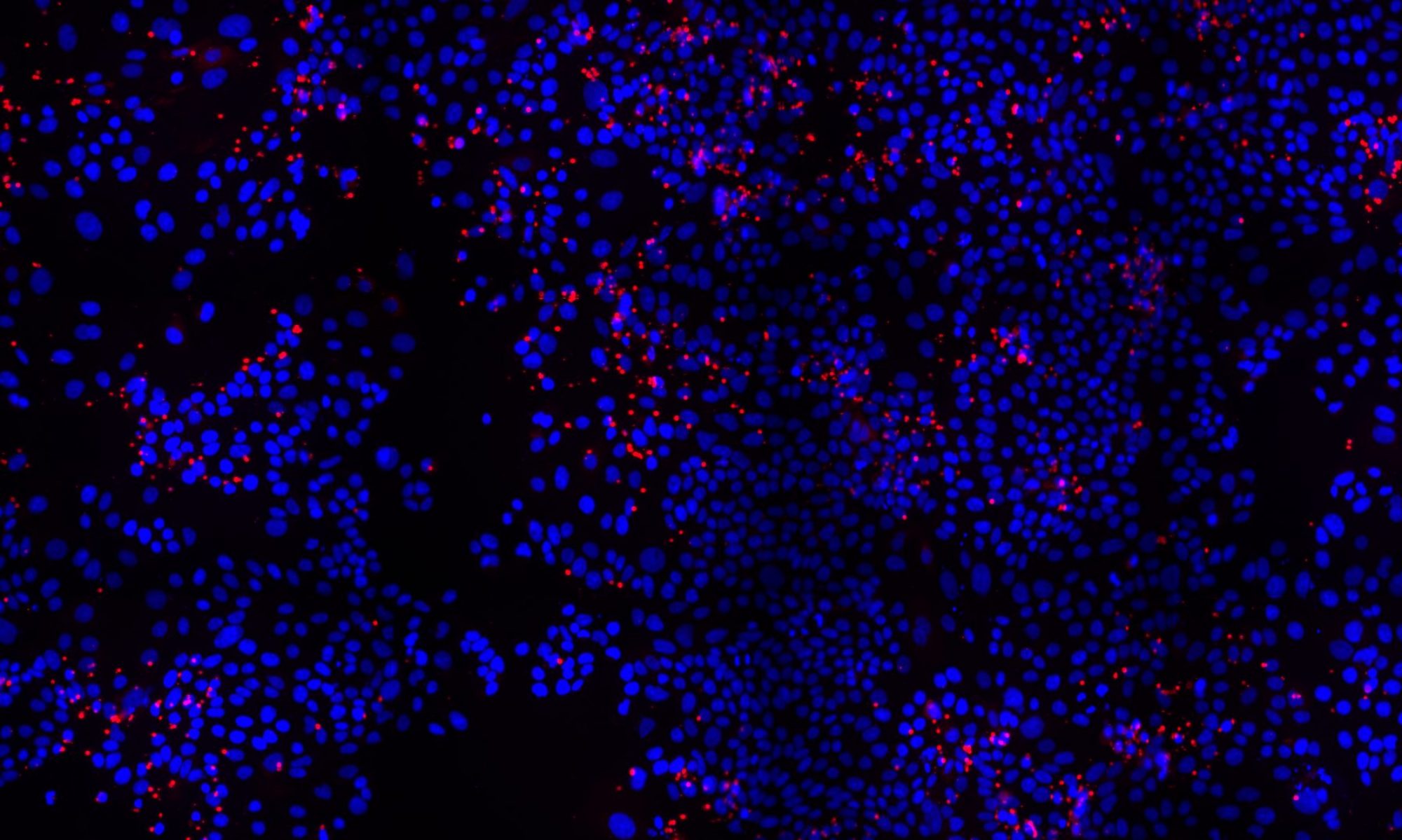2013-2023
Rodrigues, E, Pallett, MA, Straker, LC, Mkandawire, TT, Sala, K, Collinson, L et al.. Cryptosporidium modifies intestinal microvilli through an exported virulence factor. Cell Host Microbe. 2025;33 (5):719-730.e5. doi: 10.1016/j.chom.2025.04.001. PubMed PMID:40300595 .
Maradana, MR, Marzook, NB, Diaz, OE, Mkandawire, T, Diny, NL, Li, Y et al.. Dietary environmental factors shape the immune defense against Cryptosporidium infection. Cell Host Microbe. 2023;31 (12):2038-2050.e4. doi: 10.1016/j.chom.2023.11.008. PubMed PMID:38052207 .
Quintana, JF, Harding, C, Huet, D, Sateriale, A, Bernabeu, M. Editorial: Disruptive technologies for the study of host-pathogen interactions. Front Cell Infect Microbiol. 2022;12 :1048342. doi: 10.3389/fcimb.2022.1048342. PubMed PMID:36310863 PubMed Central PMC9608136.
Gibson, AR, Sateriale, A, Dumaine, JE, Engiles, JB, Pardy, RD, Gullicksrud, JA et al.. A genetic screen identifies a protective type III interferon response to Cryptosporidium that requires TLR3 dependent recognition. PLoS Pathog. 2022;18 (5):e1010003. doi: 10.1371/journal.ppat.1010003. PubMed PMID:35584177 PubMed Central PMC9154123.
Mkandawire, TT, Sateriale, A. The Long and Short of Next Generation Sequencing for Cryptosporidium Research. Front Cell Infect Microbiol. 2022;12 :871860. doi: 10.3389/fcimb.2022.871860. PubMed PMID:35419299 PubMed Central PMC8995782.
Dumaine, JE, Sateriale, A, Gibson, AR, Reddy, AG, Gullicksrud, JA, Hunter, EN et al.. The enteric pathogen Cryptosporidium parvum exports proteins into the cytosol of the infected host cell. Elife. 2021;10 :. doi: 10.7554/eLife.70451. PubMed PMID:34866573 PubMed Central PMC8687662.
Baptista, RP, Li, Y, Sateriale, A, Sanders, MJ, Brooks, KL, Tracey, A et al.. Long-read assembly and comparative evidence-based reanalysis of Cryptosporidium genome sequences reveal expanded transporter repertoire and duplication of entire chromosome ends including subtelomeric regions. Genome Res. 2022;32 (1):203-213. doi: 10.1101/gr.275325.121. PubMed PMID:34764149 PubMed Central PMC8744675.
Gullicksrud, JA, Sateriale, A, Engiles, JB, Gibson, AR, Shaw, S, Hutchins, ZA et al.. Enterocyte-innate lymphoid cell crosstalk drives early IFN-γ-mediated control of Cryptosporidium. Mucosal Immunol. 2022;15 (2):362-372. doi: 10.1038/s41385-021-00468-6. PubMed PMID:34750455 PubMed Central PMC8881313.
Hasan, MM, Stebbins, EE, Choy, RKM, Gillespie, JR, de Hostos, EL, Miller, P et al.. Spontaneous Selection of Cryptosporidium Drug Resistance in a Calf Model of Infection. Antimicrob Agents Chemother. 2021;65 (6):. doi: 10.1128/AAC.00023-21. PubMed PMID:33753338 PubMed Central PMC8316126.
Li, Y, Baptista, RP, Sateriale, A, Striepen, B, Kissinger, JC. Analysis of Long Non-Coding RNA in Cryptosporidium parvum Reveals Significant Stage-Specific Antisense Transcription. Front Cell Infect Microbiol. 2020;10 :608298. doi: 10.3389/fcimb.2020.608298. PubMed PMID:33520737 PubMed Central PMC7840661.
Sateriale, A, Gullicksrud, JA, Engiles, JB, McLeod, BI, Kugler, EM, Henao-Mejia, J et al.. The intestinal parasite Cryptosporidium is controlled by an enterocyte intrinsic inflammasome that depends on NLRP6. Proc Natl Acad Sci U S A. 2021;118 (2):. doi: 10.1073/pnas.2007807118. PubMed PMID:33372132 PubMed Central PMC7812745.
Marzook, NB, Sateriale, A. Crypto-Currency: Investing in New Models to Advance the Study of Cryptosporidium Infection and Immunity. Front Cell Infect Microbiol. 2020;10 :587296. doi: 10.3389/fcimb.2020.587296. PubMed PMID:33312965 PubMed Central PMC7708325.
Widmer, G, Carmena, D, Kváč, M, Chalmers, RM, Kissinger, JC, Xiao, L et al.. Update on Cryptosporidium spp.: highlights from the Seventh International Giardia and Cryptosporidium Conference. Parasite. 2020;27 :14. doi: 10.1051/parasite/2020011. PubMed PMID:32167464 PubMed Central PMC7069357.
Pawlowic, MC, Somepalli, M, Sateriale, A, Herbert, GT, Gibson, AR, Cuny, GD et al.. Genetic ablation of purine salvage in Cryptosporidium parvum reveals nucleotide uptake from the host cell. Proc Natl Acad Sci U S A. 2019;116 (42):21160-21165. doi: 10.1073/pnas.1908239116. PubMed PMID:31570573 PubMed Central PMC6800313.
Tandel, J, English, ED, Sateriale, A, Gullicksrud, JA, Beiting, DP, Sullivan, MC et al.. Life cycle progression and sexual development of the apicomplexan parasite Cryptosporidium parvum. Nat Microbiol. 2019;4 (12):2226-2236. doi: 10.1038/s41564-019-0539-x. PubMed PMID:31477896 PubMed Central PMC6877471.
Sateriale, A, Pawlowic, M, Vinayak, S, Brooks, C, Striepen, B. Genetic Manipulation of Cryptosporidium parvum with CRISPR/Cas9. Methods Mol Biol. 2020;2052 :219-228. doi: 10.1007/978-1-4939-9748-0_13. PubMed PMID:31452165 .
Sateriale, A, Šlapeta, J, Baptista, R, Engiles, JB, Gullicksrud, JA, Herbert, GT et al.. A Genetically Tractable, Natural Mouse Model of Cryptosporidiosis Offers Insights into Host Protective Immunity. Cell Host Microbe. 2019;26 (1):135-146.e5. doi: 10.1016/j.chom.2019.05.006. PubMed PMID:31231045 PubMed Central PMC6617386.
Pawlowic, MC, Vinayak, S, Sateriale, A, Brooks, CF, Striepen, B. Generating and Maintaining Transgenic Cryptosporidium parvum Parasites. Curr Protoc Microbiol. 2017;46 :20B.2.1-20B.2.32. doi: 10.1002/cpmc.33. PubMed PMID:28800157 PubMed Central PMC5556942.
Manjunatha, UH, Vinayak, S, Zambriski, JA, Chao, AT, Sy, T, Noble, CG et al.. A Cryptosporidium PI(4)K inhibitor is a drug candidate for cryptosporidiosis. Nature. 2017;546 (7658):376-380. doi: 10.1038/nature22337. PubMed PMID:28562588 PubMed Central PMC5473467.
Sateriale, A, Striepen, B. Beg, Borrow and Steal: Three Aspects of Horizontal Gene Transfer in the Protozoan Parasite, Cryptosporidium parvum. PLoS Pathog. 2016;12 (3):e1005429. doi: 10.1371/journal.ppat.1005429. PubMed PMID:26938451 PubMed Central PMC4777385.
Sateriale, A, Miller, P, Huston, CD. Knockdown of Five Genes Encoding Uncharacterized Proteins Inhibits Entamoeba histolytica Phagocytosis of Dead Host Cells. Infect Immun. 2016;84 (4):1045-1053. doi: 10.1128/IAI.01325-15. PubMed PMID:26810036 PubMed Central PMC4807468.
Vinayak, S, Pawlowic, MC, Sateriale, A, Brooks, CF, Studstill, CJ, Bar-Peled, Y et al.. Genetic modification of the diarrhoeal pathogen Cryptosporidium parvum. Nature. 2015;523 (7561):477-80. doi: 10.1038/nature14651. PubMed PMID:26176919 PubMed Central PMC4640681.
Sateriale, A, Roy, NH, Huston, CD. SNAP-tag technology optimized for use in Entamoeba histolytica. PLoS One. 2013;8 (12):e83997. doi: 10.1371/journal.pone.0083997. PubMed PMID:24391864 PubMed Central PMC3877135.
Koenig, A, Sateriale, A, Budd, RC, Huber, SA, Buskiewicz, IA. The role of sex differences in autophagy in the heart during coxsackievirus B3-induced myocarditis. J Cardiovasc Transl Res. 2014;7 (2):182-91. doi: 10.1007/s12265-013-9525-5. PubMed PMID:24323874 PubMed Central PMC4115281.
Search PubMed for full publication list
Search Google Scholar for full publication list


